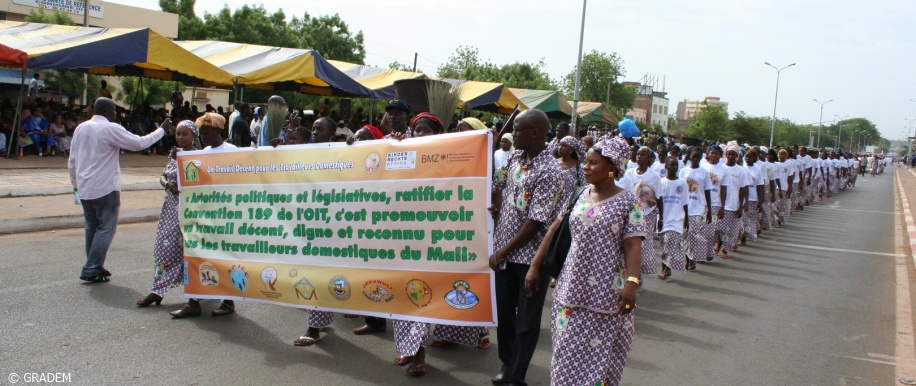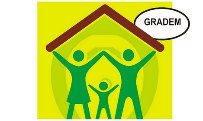Mali: Fundamental rights for underage and often exploited domestic workers
Context
For most unmarried girls in the Malian regions Ségou and Koulikoro, working as domestic worker in a city is the only opportunity to earn money for their dowry or to financially support their families. So many girls leave their villages for the capital Bamako - some of them at the age of 12 or younger.
In households however, these girls often live and work under inhumane conditions. Basic employment rights, such as regular working hours or the social security, are often refused to them. Furthermore, it is not common that they have a day off during the week, let alone vacation.
The economic exploitation of these girls is often accopmpanied by sexual abuse or violence. Without a social network in the city or knowledge about their fundamental
rights, they often don’t know, how to defend themselves. If they are expecting a baby, they usually lose their occupation and have nowhere, to turn to for support.
Project Objectives
Girls, who leave their home town to find an occupation in Bamako, shall be informed about the risks, accompanied, professionally trained and protected.
The Convention 189 of the International Labour Organization (ILO) on humane working conditions of domestic workers shall be ratified by the Malian state and be respected.
In particular, 240 girls (from the age of 15) working in households in Bamako shall:
- receive basic education for their work in the domestic sector,
- live under conditions, where their rights as employees are respected,
- know how to defend themselves against violations of their rights.
The girls shall, on the one hand, be prepared for their (future) occupation as domestic workers and be equipped with the necessary knowledge and experience, so that they can demand appropriate payment. On the other hand, the girls will be informed about their rights and duties as employees as well as self-protection.
Additionally, 250 girls under the age of 15 shall be reintegrated into their families and into school education as they have not reached the minimum age of working, yet and have to be particularly protected from exploitation and overstrain.
1.200 girls at risk of economic exploitation shall know their rights, how to defend themselves and where to find support.
Project Activities
In cooperation with our local partner GRADEM, we offer pregnant girls and underage mothers a safe shelter in our center for the protection of children, called “Bamunan - Hope and Life”. We accompany the girls during pregnancy and birth and offer classes on infant care, hygene, reproductive health, basic reading and calculating, children's and women's rights as well as their rights as an employee.
Girls from the age of 15 further have the possibility to take professional training classes on domestic work, do an apprenticeship as a tailor or soap-manufacturer in order to be able to offer qualified work and demand regular pay and humane treatment.
We offer legal advice to exploited and/or abused girls and help young mothers with obtaining a birth certificate for their children - a predisposition for school attendance, taking exams or gaining access to fundamental civil rights.
Girls under the age of 15 are prepared for and supported with their reintegration into their families, schools and social environment.
On legal and political level, our aim is to establish a protective environment based on a legal framework, that meets internationally accepted standards with respect to labor protection and children’s rights. In this sense, we collect legal norms in Mali protecting children’s and employment rights and spread them via awareness-raising campaigns and radio broadcasts. State representatives (lawyers, deputies, ministers etc.) are being trained in children's rights and are being mobilized to become involved in the protection of underage workers.
At the same time, our project in the regions of origin aims at enhancing work and education opportunities for girls in rural regions, so that they are not forced to migrate to the cities and work under exploitative conditions.
Funding
Project costs: 848,335 €
Financial Partners:
- European Commission
- German Federal Ministry for Economic Cooperation and Development (BMZ)
- Globus-Stiftung
- Kinderrechte Afrika e.V. (donations)
Koné's Story
Koné (name changed) originally comes from the region of Ségou and had to leave school after just four years, as her parents couldn’t afford her school fees. Koné explains:
“My parents sent me to my aunt, who lives in Bamako, two years ago. There, I worked as a domestic worker. At the farm, where my aunt lives, there were many other tenants. One night, I got to meet the landlord’s brother. He showed me some music on his mobile phone. Another night, he told me he loved me. He wanted me to come with him. I refused, and my aunt protected me very well. But, one time, I gave way to his request. Three days later I felt sick. My aunt took me to the hospital and told me that I was pregnant. My aunt invited the father-to-be to her home so that we could have a talk. He ignored her. Then, she called the police for help. They cited him to the police station and took him into custody. But he got released. I think that he returned to his home town. I was lucky in an unlucky situation: somebody told me about the center 'Bamunan'. There, I received help.”
Koné received medical and psychosocial treatment after she arrived at Bamunan. She gave birth to her baby under safe conditions. The social workers of GRADEM found out about the residence of the baby’s father and he agreed to acknowledge the paternity. This made it possible for the baby to receive a completed birth certificate. Koné took a literacy class, a child-care class as well as cooking and sewing lessons. After she had learned the basics, she decided to start an apprenticeship to become a tailor. She learned to create easy, fashionable clothing. Meanwhile, she has a regular income and can take care of her child.
Cover photo: Demonstration of underage domestic workers for better working conditions in Bamako. Children have the right to freedom of expression, Art. 13 UN-CRC, and the right to an appropriate standard of living, Art. 27 UN-CRC.
© GRADEM






